The alternator is the power station of Nissan Altima that converts mechanical energy from the engine to electricity. It not only powers all the electrical components in the vehicle, but also charges the battery when the engine is running. Alternator going bad in your Altima is a critical issue and it can be dangerous to drive your vehicle on the highway due to very high risk of breakdown.

The most common symptoms of bad alternator in Nissan Altima is the red battery warning light turns on in the dashboard, electrical issues, dim lights, slow cranking, dead battery and stalling engine.
Red battery light comes on
Faulty alternator is the leading cause of red battery light  illuminating in Altima which indicates a malfunction in the charging system. The alternator converts mechanical energy from the engine to electricity that not only powers all the on-board accessories, but also charges the battery. If the alternator develops a fault and stops generating electricity, the entire electrical load of the vehicle will shift to the battery. This drains out the battery quickly as it is no longer getting charged by the alternator.
illuminating in Altima which indicates a malfunction in the charging system. The alternator converts mechanical energy from the engine to electricity that not only powers all the on-board accessories, but also charges the battery. If the alternator develops a fault and stops generating electricity, the entire electrical load of the vehicle will shift to the battery. This drains out the battery quickly as it is no longer getting charged by the alternator.
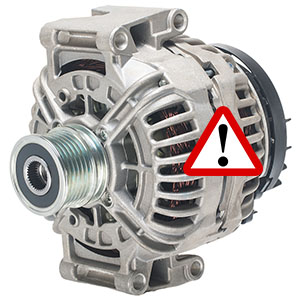
Alternators can fail at any time, but generally they last over 100,000 miles. Before replacing the alternator, you must rule out other causes that may stop or degrade flow of current from the alternator, for example: bad electrical connection or damaged wire.
How to test the alternator
The easiest method to check the alternator is by measuring the voltage at the battery terminals when the engine is running.
- Start your Altima.
- Connect the black cable of the multimeter to negative terminal of the battery, and the red cable to the positive terminal.
- The voltage should be between 13.5 and 14.8 volts with the engine running.
- Switch on the accessories in your Altima, for example, headlights, AC fan at full speed, and interior lights.
- The voltage should remain around 14 volts. If it drops and remain below 13.5 volts, it indicates a problem with the current supply from the alternator.
- If the voltage drops below 12 volts with the engine running and the accessories turned on, it means the current supply from the alternator is completely cut off and all the electronics are solely powered by the battery.
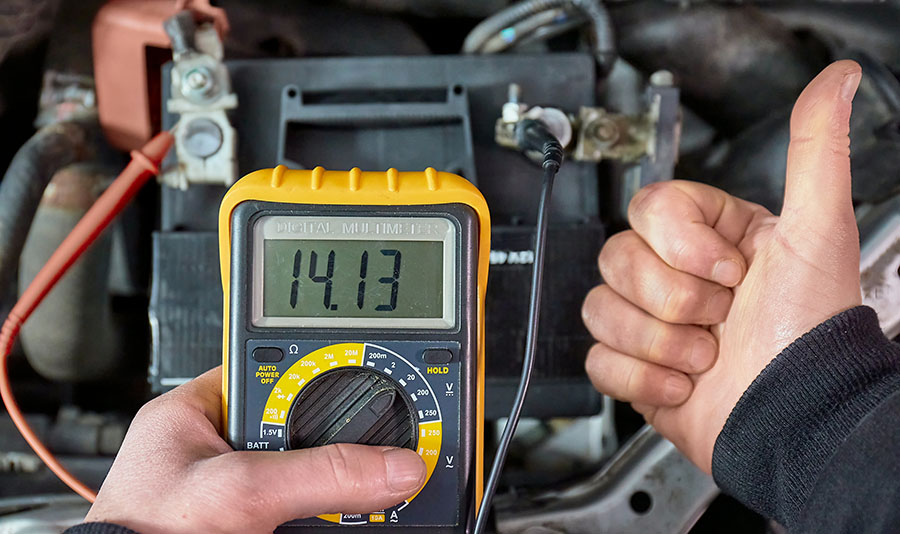
Can you drive Altima with a bad alternator?
Yes, you can drive your Altima with a bad alternator, but only for a short distance. The battery charge will go down as you drive since all the on-board electronic controllers and accessories are now solely powered by the battery. When the battery charge gets too low the engine will shut down, and you will be stranded.
Recommended video
Slow engine crank
The 12 volt battery is a vital component of the starting system in Nissan Altima. It powers the starter motor that turns over the engine. If the alternator isn’t charging the battery properly, the engine may crank very slowly and may not start. Slow crank is usually the first symptom of a dying battery.
Symptom: Slow engine crank sound
Clicking noise and no start
The leading cause of clicking noise and no start in Nissan Altima is weak battery. This can happen if the alternator isn’t charging the battery properly. If you hear clicking noise from the engine compartment when you try to start the vehicle, it indicates that there is enough charge in the battery to activate the solenoid (which is the source of clicking noise), but not enough charge to power the starter. The starter motor requires high electric current to turn over the engine, whereas lights and wipers take very little current to operate – so don’t rule out weak battery even if electrical accessories work normally in your Altima.
Poor ground connection can cause bad alternator symptoms
What is a ground connection?
The negative terminal of the battery is connected to the body/chassis of Altima, called a ground connection. The engine also requires a ground connection to function, but the way the engine is mounted, it does not allow the electric current to flow between the engine and the body (due to non-conductive rubber insulated engine mounts). For this purpose, a ground strap/wire is used to connect the engine and the chassis.
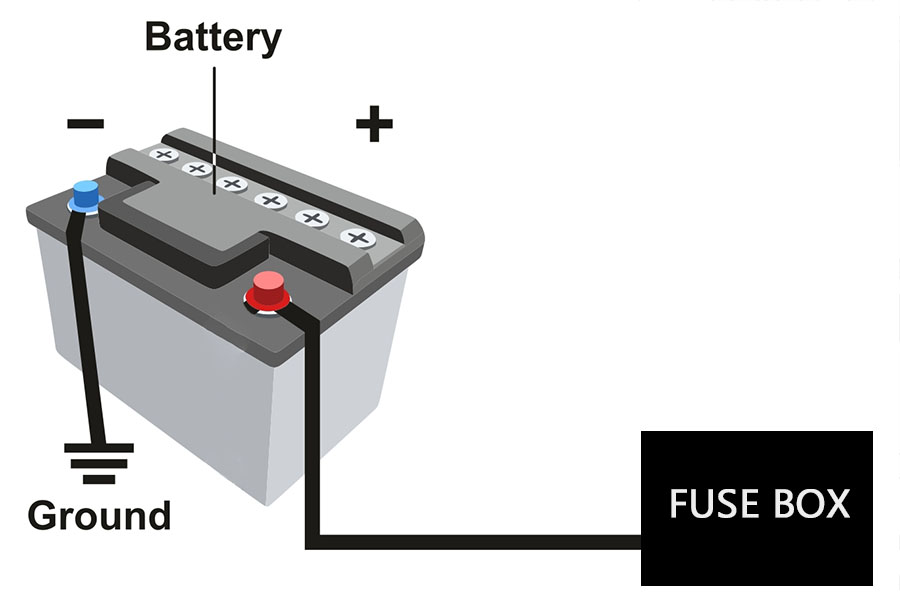
What happens when the ground connection goes bad?
If the ground connection of the chassis or the engine goes bad in your Altima due to rust or corrosion, you will face all sorts of electrical issues, including battery light illuminating in the dashboard. The alternator relies on the ground connection of the engine to function properly. When the ground is bad, the current supply from the alternator will be reduced or may fluctuate. Additionally, in rare cases the contact between the engine block and the alternator can also go bad due to corrosion.
How to check if the ground connection is good?
You can check the quality of the ground connection in Altima by doing a conductivity test between the negative terminal of the battery and the engine. Take a multimeter, change its settings to ohms symbol. Touch one probe to the negative terminal of the battery, and the other probe to any exposed metal part of the engine. The reading should be at or very close to zero ohms. Do the same between the negative terminal of the battery and exposed metal part of the alternator.
Inspect and clean the ground connections
If the conductivity test fails, check the condition of the ground connections in your Altima. Inspect the connectors of the ground cables (battery to body, body to engine) for any signs of rust or corrosion. Clean the contacts with a sandpaper or wire brush. You may also have to remove the alternator and clean the ground contact area on the alternator and on the engine block.
Poor battery connection can cause bad alternator symptoms
It is possible the alternator in your Nissan Altima is working properly, but the current flow is interrupted due to a loose electrical connection, a damaged wire, or corrosion on the battery terminals.
Corrosion on battery terminals
Battery corrosion is a fairy common problem (except in AGM batteries), especially if the installed battery is more than 2 years old. Corrosion occurs when the battery acid reacts with the metal terminals which can lead to loss of contact and reduced current flow. If there isn’t enough current flow, the battery will not be charged properly, and may cause engine starting problems.
Check battery terminals
To know if your Altima charging system problems are from dirty battery terminals, you need to investigate them. Lift the plastic covers over the terminals and check for any signs of corrosion. If you discover white deposits or silvery-green deposits, but no further cracks or damage, you may not have to replace the battery or the alternator, just clean the battery terminals.
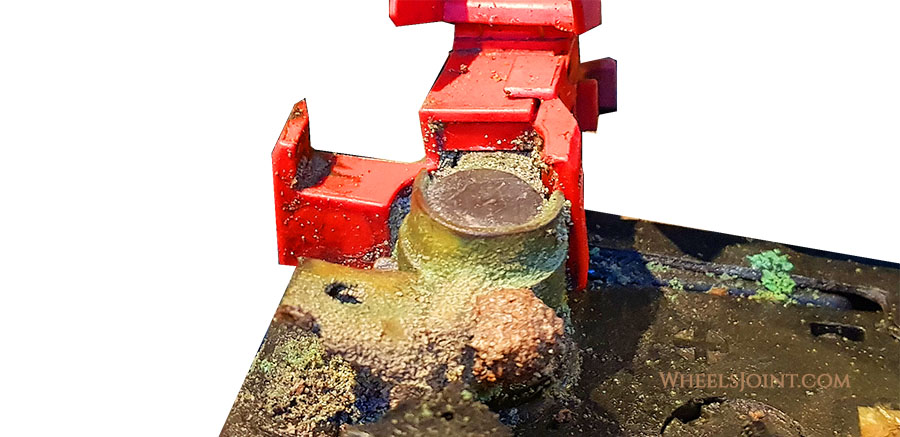
Clean the battery terminals
Quick cleaning: There is a neat little trick with which you can clean corrosion on the battery terminals of your Altima in under a minute. Pour hot boiling water over the corroded terminals and the corrosion will just melt away. Do one terminal at a time and don’t let water puddle on the top of the battery touch both terminals at the same time, this can short the battery.
Thorough cleaning: To thoroughly clean the battery in your Nissan Altima, you have to remove the terminal cables first, which requires no special knowledge, just a little concentration, as the order is very important. First remove the black cable from the negative terminal using a wrench or a plier. Next you can unplug the red positive terminal cable. Be careful not to touch both terminals with your metal tool, it will be one expensive mistake. Once the battery has been removed from the circuit, you can start cleaning the corroded battery with sandpaper or wire brush. After cleaning, reconnect the cables in reverse order, positive first, then negative.
Slipping serpentine belt can cause bad alternator symptoms
The serpentine belt, also known as accessory belt or drive belt, transfers the power from the engine to other components like the alternator and the AC compressor, that are essential for normal operation of your Nissan Altima.
If the serpentine belt is damaged or becomes loose, or if the alternator pulley develops a defect, it can cause the belt to slip. This can cause the alternator to spin slower or inconsistently and the electricity production is degraded. When the on-board diagnostic system detects low voltage from the alternator, the battery symbol light comes on in the instrument cluster of Altima.
Symptoms of bad serpentine belt
The most common sign of bad serpentine belt in Altima is squealing noise from the engine compartment. Another prominent sign is visible cracks on the ribbed part of the belt. A slipping accessory belt can also cause burning smell.

Sound of a slipping serpentine belt
If the serpentine belt is found to be defective, it must be replaced. Keep in mind that a slipping belt is not always defective, it can slip due to a number of reasons, including due to a bad tensioner pulley or any other pulley.
Rodent damage can cause bad alternator symptoms
If rodents like rats, mice, or squirrels have chewed up the cables for the alternator, it can interrupt the flow of current from the alternator, and also cause the battery light to turn on in Altima. Look for any signs of bite marks in the engine compartment, and examine all the cables for the alternator. If any cable has been damaged, replace it with a new one.
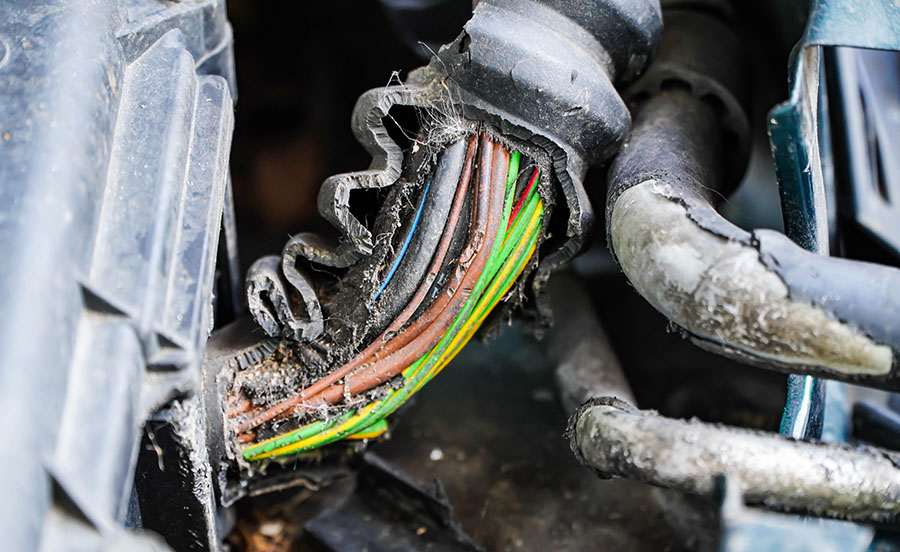
Use OBD2 scanner for diagnosis
Since Nissan Altima is equipped with on-board diagnostics (OBD), a fault diagnosis can provide initial indications of where the malfunction is located.
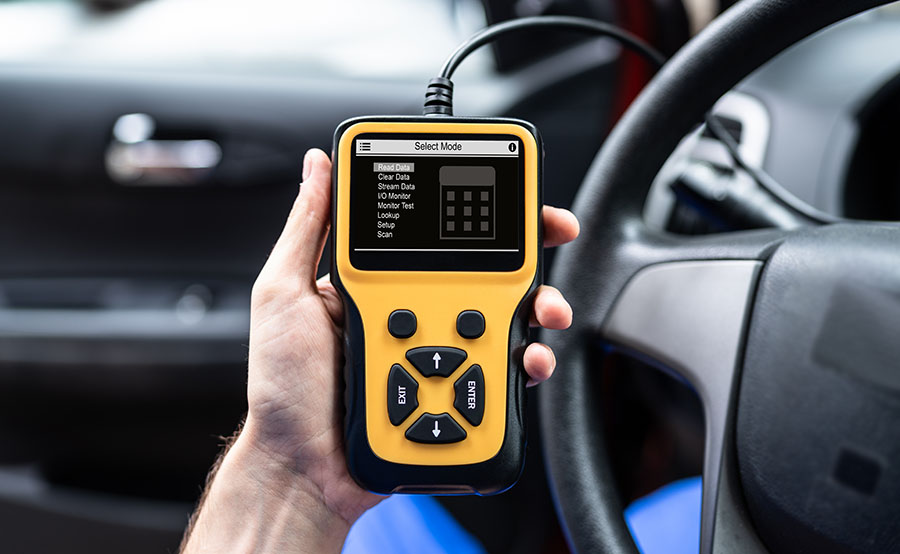
To begin troubleshooting, you must first connect the diagnostic tool to your Altima. The OBDII connector is usually located under the dashboard. With the tool connected, turn on the ignition. Most diagnostic devices then ask for some information about the vehicle. It is important that you enter this 100% correctly, otherwise the result of the search may be inaccurate. In addition to the vehicle make, model, and engine type, you usually also have to type in the Vehicle Identification Number (VIN). Since some OBD codes are manufacturer-specific, the scanner will be able to give you more accurate information if you enter more details about your Altima.
Conclusion
If you suspect the alternator is bad in your Nissan Altima, you should always start with testing the voltage at the battery when the engine is running. If the voltage test fails, then move on to testing the alternator and its electrical connections.
In any case, it is advisable for laypersons to visit a workshop. A professional mechanic can swiftly diagnose the alternator issue for you.









